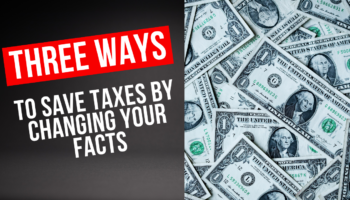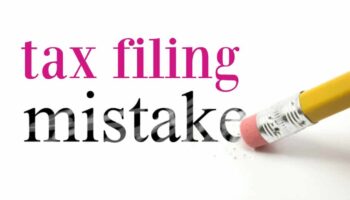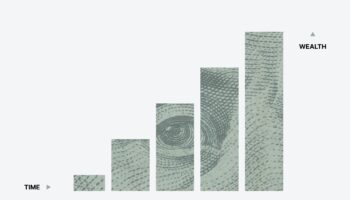Taxes are by far the largest cost that most households face, yet most people do nothing to manage their taxes
“The best things in life are free, but sooner or later the government will find a way to tax them.” — Anonymous
Whether you like it or not, taxes affect all of us. The news media is always talking about the top three costs for households:
- Housing (rent or mortgage)
- Car (loan payments and interest)
- Education or Child Care (student loans or child schooling)
The truth is, they are wrong. Taxes are by far the largest cost that most households face, yet most people do nothing to manage their taxes.
Over the years, I have filed thousands of personal tax returns for a broad range of clients. From those earning half a million dollars per year to clients with little or no income.
With our marginal tax rate system in Canada, the more you earn, the more attention you should pay.
To help you plan better, I’ve put together the top 10 reasons why you may be paying too much in taxes.
These top 10 reasons are of course, my opinion. They are based on my experience from what I’ve seen over the years working with different clients.
Review them and consider what changes you can make today to save on taxes.
1. Lack of a periodic tax plan
“If you fail to plan, you are planning to fail.” — Benjamin Franklin
This is a big one. Most people will only discuss taxes once a year during tax filing season.
That’s a bad idea.
Planning is critical for both individuals and businesses to ensure that you’re optimizing your taxes.
Tax laws change from time to time and planning ensures you’re on top of these changes and positioned to take advantage of the changes as they occur.
If you are an individual with assets, you have to plan to ensure assets are transferred to your spouse or kids on a tax-efficient way to avoid significant tax consequences on death.
If you own a business, succession planning is critical as there are significant tax implications if you’re considering selling or transferring ownership of your business.
Overall, significant changes in life and the major transactions we make throughout our life will often have huge tax implications. So, you want to stay ahead of this with proper tax planning.
2. Employment income is your only source of income
“In today’s uncertain economy, the safest solution to be wealthy, be in total control and enjoy freedom for you and your family is to have multiple streams of income.” — Robert G. Allen
If employment income is your only source of income, you have minimal opportunity to manage the taxes you pay.
It’s worse if you’re a high income earner (i.e. you gross over $100,000 per year) as you will be in the high end of the income tax bracket.
The high marginal tax rates on employment income in Canada is one of the major reasons the average middle class person finds it challenging to save or get ahead in this economy.
Another reason is that the average employee pays for expenses using after tax dollars with additional sales tax on these expenses.
So, if you’re employed with high income, you have to be creative and to deliberately plan on how to shift income, income split and convert your employment income to other sources of income that are taxed at far better rates.
Strategies may include starting a side business, investing in real estate, negotiating compensation with your employer and creating opportunities to income split with other family members.
3. You never review your tax returns for opportunities to save on taxes
“I don’t know if I can live on my income or not — the government won’t let me try it.” — Bob Thaves
It is common to file your tax return and never review it for opportunities to save taxes in subsequent years.
How many times have you sat down with your tax advisor to discuss how to improve your tax position?
How many times have you reviewed each line on your tax return to understand the nature of income reported, and the marginal tax rate applicable to the income?
Without adequate review, you miss opportunities to adjust and plan ahead.
Often, tax credits and tax deductions you may be entitled to are not claimed as a result of lack of review.
If you don’t take the time to review, you will miss opportunities, and you will pay more than your fair share of taxes.
4. You don’t take advantage of the tax breaks from TFSA and RRSP Contributions
“There may be liberty and justice for all, but there are tax breaks only for some.” — Martin A. Sullivan
Whether you like it or not, whether you agree or disagree, Tax Free Savings Accounts (TFSAs) and Registered Retirement Savings Plans (RRSPs) provide tax benefits!
For RRSPs, taxes deferred to future years puts cash in your pocket today that can be invested, spent or put to other uses.
There are so many misconceptions out there about RRSPs.
One that I hear from time to time is that the government has control of your money.
This is not true!
You have total control of your RRSP investments if you self direct it or manage it yourself in a brokerage account.
Others simply refuse to contribute to RRSPs because they say you will pay taxes when you withdraw from the RRSP in future years.
Yes, you will. However, will you rather pay the taxes today or in the distant future?
For TFSAs, you contribute with after-tax dollars but the income and growth in the account is tax-free.
You certainly want to maximize your RRSP and TFSA contribution room before investing in non-Registered accounts to save on taxes. However, tax planning considerations should be taken into account when utilizing these tax breaks.
5. You’re either single or you act like you are
“The purpose of a tax cut is to leave more money where it belongs: in the hands of the working men and working women who earned it in the first place.” — Bob Dole
There is absolutely nothing wrong if you’re single.
However, if you’re single, the Canadian tax law is not your best friend.
Our tax system is more favorable to families as there are more opportunities to share credits and income split.
Despite the benefits of filing taxes as a family, I still find married couples acting like they’re single as they file separately. As a result, they miss out on potential benefits and tax savings had they filed together as a family.
Moreover, filing your tax returns separately is more likely to result in errors where different members of the family are claiming the same credit or deductions. Often, this will result in unfavorable tax reassessments.
6. You file your tax returns yourself
“You don’t pay taxes — they take taxes.” — Chris Rock
There is nothing wrong with filing your tax returns yourself with the number of relatively cheap or free tax software programs out there.
If you have a simple tax situation with only employment income and nothing else, you will likely be fine.
On the other hand, if your tax return is a little complicated with family, investment income, business income or rental income, you will certainly need the help of a professional if your tax knowledge is not strong.
Filing your taxes yourself with limited knowledge is certainly a recipe for missing credits and deductions and paying too much in taxes.
7. You don’t have a competent Tax Advisor
“Today, it takes more brains and effort to make out the income-tax form than it does to make the income.” — Alfred E. Neuman
And this is why you need a competent Tax Advisor.
Whether you file your taxes yourself or not, it is important to have a professional Tax Advisor that can give you a competent opinion and advice on your situation.
Professional Tax Advisors are held to a higher standard, belong to a regulated professional body that requires minimum educational qualification and ongoing professional development.
These professionals often undergo periodic review of their practice and are required to hold the public interest in high regard.
Also, even if you have a competent tax advisor you’ve been working with for several years, it is advisable, particularly for complex situations, to seek a second opinion just to get fresh set of eyes looking at your situation.
8. You lack basic knowledge of taxes
“The hardest thing in the world to understand is the income tax.” — Albert Einstein
Fortunately, today there are more opportunities for you to learn about taxes. So it’s no longer the hardest thing in the world to understand.
Ultimately, you are responsible for information reported on your tax return, not the tax accountant or filer!
At the end of the day, you have to sign and authorize the tax accountant to file your tax return. By doing so, you’re telling the Government (Canada Revenue Agency or CRA) that you have reviewed your tax return and you are comfortable that all information reported is accurate.
To do this correctly, you must have some basic knowledge of tax, without which you cannot complete a reasonable review of your tax returns.
Getting basic knowledge of taxes is particularly more important if you’re not engaging a reputable professional to prepare your tax returns.
9. You never negotiate the structure of your compensation
“We don’t need new taxes. We need new taxpayers, people that are gainfully employed, making money and paying into the tax system.” — Marco Rubio
Given that various types of income attract different tax rates and certain employment benefits are tax-free, there are opportunities to negotiate your compensation to minimize your taxes.
If you are a full-time employee, you can take advantage of these opportunities when negotiating with your current or future employer.
If you’re a contractor, you can also negotiate and structure how you want to be paid for maximum tax benefits.
10. You celebrate when you get a huge tax refund
“Next to being shot at and missed, nothing is really quite as satisfying as an income tax refund.” — F.J. Raymond
Many people celebrate getting a large refund, thinking of it as a surprise bonus.
In some cases, they give too much credit to the Tax Accountant for getting them a huge refund (assuming of course there is no tax fraud).
Often times, this credit given to the Tax Accountant is not warranted.
What it really means is that more of your money was collected for income taxes than necessary.
Rather than leaving that money with the government, you will be better off earning interest of 2 % to 3% on that money left in your savings account.
Careful tax planning can help ensure that you send only the amount necessary in advance tax payments. If you can, send less instead.
In Conclusion
“Some taxpayers close their eyes, some stop their ears, some shut their mouths, but all pay through the nose.” — Evan Esar
Don’t just read this and do nothing…you’ll be in the same situation next year!
Consider one tip you can implement now to be in a better tax position next year.
Remember, money saved in taxes could be put to other uses…
Save it.
Invest it.
Enhance your lifestyle with it.
Give it away.






